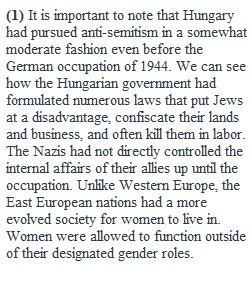


Q 1. As the situation in Hungary becomes tense, where, in what acts, are women resisting? On the other hand, in what instances are they internalizing the abuse? Do women in this reading have any unique fears or experiences? Do the men? What fears or experiences do men and women share? Cite from the reading to support your response. 2. Judith is heckled for being Jewish while she recites a poem at a Hungarian celebration. She digs in and continues on. Later, her mentor Dr. Biczo brushes her concerns aside, assuring her that there are very few Nazis in their town and that it is 'better to suffer an injustice than to commit one.' As she leaves his office she notices a tree bow humbly to the ground and rise up again. What tone is she setting here, describing Biczo's advice and her (and the tree's) performance? What do you think: is it always nobler to be the passive victim? Cite from the reading to support your response.
View Related Questions